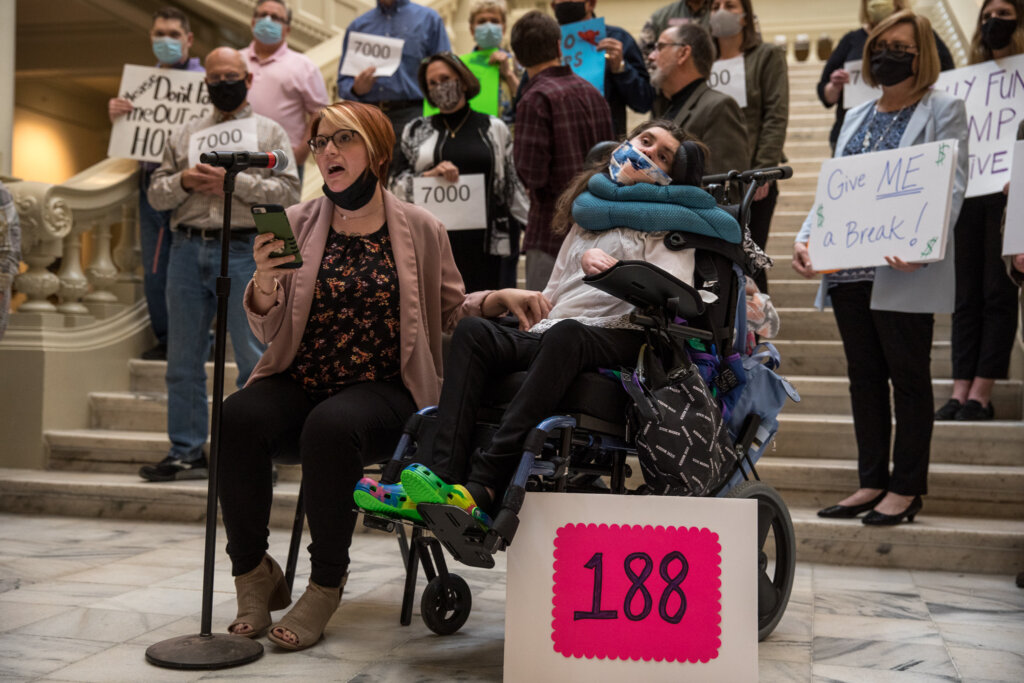
State agency officials have abandoned a controversial plan that would have limited at-home nursing care for about 200 people with disabilities, potentially upending life as they know it.
Under the proposed change, dozens of people who are receiving up to 24-hour care in their own or family home would have seen their aid limited to 16 hours. The state had pitched the plan to stretch existing dollars further to serve more of the 7,000 people on a waiting list.
The proposal, though, left the families of at least 188 people weighing whether to seek different living arrangements – such as moving their loved one in with three roommates and sharing support staff at a licensed provider home – or trying to come up with the money to make up the difference.
“There were some families and stakeholders that believed they were going to be impacted by the changes in the waiver, so there are no changes to the waiver, and those individuals and families will not be impacted,” Judy Fitzgerald, commissioner of the state Department of Behavioral Health and Developmental Disabilities, told the agency’s board Thursday.
The announcement sparked cheers from advocates like Pam Walley, who is the quality and compliance director with Georgia Options, a service provider that focuses on supporting people with disabilities through non-congregant settings.

Walley is also the mother of 26-year-old Callie Moore, who lives in an Athens apartment with a roommate with whom she shares overnight staff support. Moore would have seen her around-the-clock nursing services reduced under the now-shelved plan.
Walley and others had pressed the state to find another way to serve more people on the waiting list.
“I am ecstatic to learn that people who need nursing services and additional staff supports will have the right to access these services while living in their own homes,” said Walley. “Self-advocates, families, and allies have worked very hard to make our concerns known to state leaders, and we weren’t always sure we were being heard.”
The change had been included in the state’s Comprehensive Supports Waiver (COMP) renewal through Medicaid, which is part of a program designed to help people with disabilities avoid institutionalization.
The cost to provide services for the 188 people who receive up to 24-hour care in their own or family home is about $22 million, with the federal government picking up a little more than half the cost.
It was never clear how many people could have potentially come off the waitlist as a result of the change. State lawmakers added about $2 million to this year’s budget with the intention of funding about 100 slots.
The state resubmitted its waiver plan last month without the cap on nursing hours because of a provision in the American Rescue Plan Act requiring states to maintain the existing level home and community based services.
But the change of plans also brings agency leaders back to square one with their efforts to reach more of the thousands of people with disabilities who are awaiting services.
Advocates and families have been asking the state to ramp up funding for waiver services. Challenges exist beyond funding, though. Providers, for example, have struggled to keep enough direct-support professionals on their payroll to carry out the services.
“Our goal with the proposed changes was to serve as many people as possible,” Fitzgerald said in a statement Thursday. “While we removed the proposed caps on skilled nursing and additional staffing hours from our waiver application, we are not abandoning our commitment to the 7,000 people who still wait to be served.”
State Sen. Sally Harrell, an Atlanta Democrat, is pushing a different approach: lobbying the governor to increase funding for services enough to knock out the waiting list over the next five years.
“The state has enough revenue to fund more waivers. They just haven’t had the political will to do it. So, setting the cap was not necessary. Taking from one group to serve another group was not necessary because the state has the money to serve both,” Harrell said Thursday.
Gov. Brian Kemp’s spokesperson, Katie Byrd, said Thursday the governor’s office is not yet ready to discuss budget items. The governor will formally unveil his spending plan next month when lawmakers return to Atlanta for the legislative session. As directed by the governor, Fitzgerald submitted a flat budget proposal for her agency.
State lawmakers have been funding about 100 to 250 waivers each year in recent years. But the push for more funding now comes as the state sees its coffers swell. Revenues for the year so far are up nearly 17% over last year, according to a report issued this week.
“We hope that the governor will use surplus funds to increase the number of waivers available to support individuals with developmental disabilities and their families,” said Eric Jacobson, executive director of the Georgia Council on Developmental Disabilities. “In addition, we hope that the Governor will provide the funds to increase wages for direct support professionals.”
The jump in revenue means there will also be many other causes competing for a slice of the funding – even as politicians champion election-year pitches to cut taxes.
“You don’t cut taxes before you serve these people,” Harrell said. “Because this is something that’s part of basic governance.”
“People are afraid to make commitments that you have to keep year after year after year, which this would be one of them, because we don’t know what’s on the horizon in terms of the economy,” Harrell said. “But, to me, if we’re going to do it, then now’s the time.”






